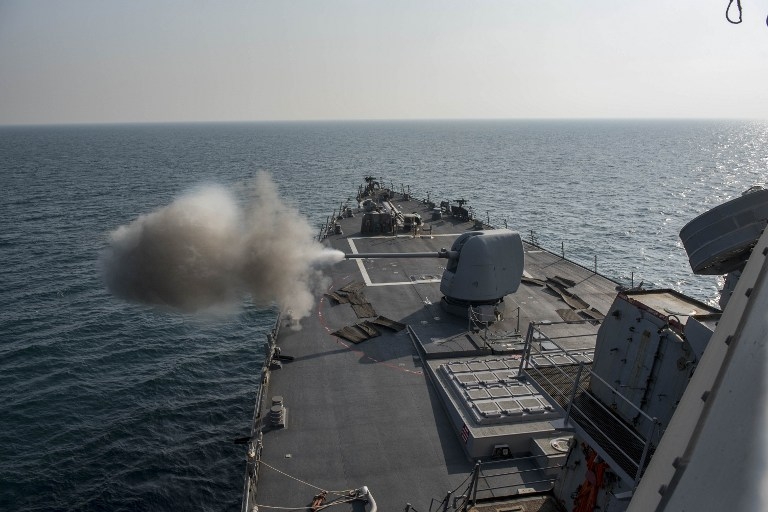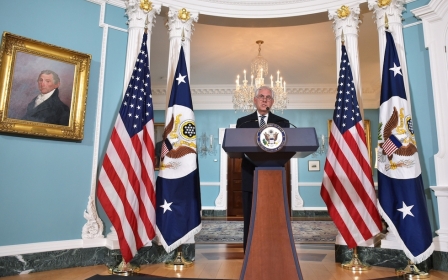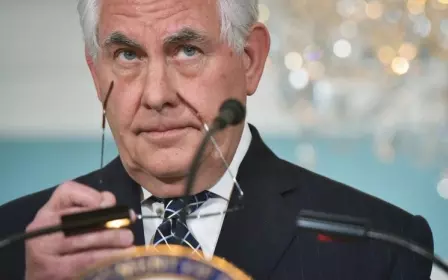Why American calls to escalate militarily against Iran are dangerous

Don’t be fooled, there will be no US-imposed regime change in Iran without a bloody, drawn out and costly war.
Washington’s peddlers of regime change in Tehran may use sanitised euphemisms for war like “push back” or “pressing on all fronts”, but this does not alter the reality that their proposals all lead to a brutal confrontation.
Pretending such an intervention would be welcomed by the Iranian people or is necessary for the protection of human rights undermines the very Iranian voices for democratic change that regime-change advocates purport to elevate.
Calls for increased sanctions, an amplified US military presence in the region and direct confrontation with Iran, will not only fail to upend the Islamic Republic but will instead pull the US into yet another unending war.
History of failure
Let’s revisit the track record of US intervention over the last two decades. Not a single one has produced a stable democracy that doesn’t require a sustained US military presence. This is true despite surges that at times surpassed 100,000 boots on the ground.
For nearly three years, Iraq’s second largest city, Mosul, has remained under the control of the Islamic State (IS) group.
Places like Tarin Kowt, Afghanistan, where I served as a Marine in support of Australia’s Special Operations Task Group, was once an oasis of security despite being encircled by Taliban-infested badlands. Numerous Australians and Afghans gave their lives to secure the surrounding districts. In the past two years, large Taliban incursions into the city, unimaginable at the time of my 2012 deployment, have led the provincial government to make statements such as: “If reinforcements do not arrive, this city will collapse into the hands of the Taliban."
Helmand province’s Sangin valley, secured with the blood of countless Marines and, at one time, lauded as a trophy of the US surge in Afghanistan, have since been fully retaken by the Taliban.
Meanwhile, much of Libya serves as a refuge for IS to carry out its brutal crimes. The confidence of interventionists is incongruent with a resume replete with failure.
False premises
To suggest that Iran, a country with a relatively robust conventional military, strong central state and national identity, an impenetrable terrain, and a long history of resenting US interference in Iranian affairs, could be the first success story is reckless.
It is also misleading to promote limited intervention in Syria or Yemen under the guise of human rights or as a means of pushing back on Iranian proxies. Entry into these conflicts is the preamble to a greater conflict with Iran and only serves to limit Iran’s retaliatory capabilities during the war that follows.
Even more careless is the oft-repeated proposal that regime change in Iran could be achieved through a cocktail of surgical strikes, sanctions, and limited proxy conflicts. These actions, so the logic goes, would give dissident groups in Iran the confidence to revolt on their own.
If proponents of regime change in Iran genuinely believe it is a goal worth pursuing, they should be transparent about its cost. The price of US-imposed regime change in Iran would undoubtedly be thousands of American lives, tens of thousands of Iranian lives and billions of dollars.
The parade of human misery resulting from past attempts at regime change does not persuade its staunchest proponents because there is a strong belief that each new country presents a unique opportunity for it to work. Iran is not that opportunity.
Indifferent to the masses
Recently, in the Washington Post, Ray Takeyh and Reuel Gerecht berated President Obama for not interfering in the Green Movement protests that followed Iran’s fraudulent 2009 elections.
But the proponents of regime change are indifferent to desires of the Green Movement itself, whose leadership did not want America’s support or endorsement. Such an intervention would also have been rejected by an Iranian populace deeply resentful of past US interventions.
And perhaps most importantly, the movement achieved some of its goals without US assistance. Although Ahmadinejad succeeded in a second term despite mass protests, the election of Hassan Rouhani in 2013 was very much the revenge of the Green Movement. The Green voters of 2009 brought Rouhani his stunning victory.
When push came to shove, the Iranian masses chose to avoid a bloody confrontation with the regime and instead chose to wait for the next opportunity to impose their will on the Iranian system peacefully.
Learn from mistakes
Decision-makers in Washington should take note that the Iranian masses’ patience and strategic acumen came years before Western audiences were disabused of their romantic illusions about revolutions, following the dismal post-revolutionary outcomes in Syria, Libya, and Egypt.
Iranians know much better than anyone in Washington what is good for them and their country
The conclusions of this are obvious: Iranians know much better than anyone in Washington what is good for them and their country. And having experienced a revolution that brought much chaos and extremism, but did little to fulfill its promises, they are understandably wary of going down that path again.
If only Washington’s foreign policy elite had that capacity to learn from its regime-change mistakes.
- Adam Weinstein served in the Marine Corps and deployed to Afghanistan. He is a policy associate at the National Iranian American Council (NIAC).
The views expressed in this article belong to the author and do not necessarily reflect the editorial policy of Middle East Eye.
Photo: This US Navy handout photo, obtained on 26 April 2017, shows The Arleigh Burke-class guided-missile destroyer USS Mahan (DDG 72) as it fires its Mark 45 5-inch gun during a pre-action calibration firing on 11 January 2017 in the Gulf. Mahan is part of the George H.W. Bush Carrier Strike Group, which is deployed to the US 5th Fleet area of operations in support of maritime security operations designed to reassure allies and partners, preserve the freedom of navigation and the free flow of commerce in the region. A US warship has fired a warning flare at an Iranian Revolutionary Guards vessel that refused to maintain distance in Gulf waters, a US spokesman said 26 April 2017 (AFP)
New MEE newsletter: Jerusalem Dispatch
Sign up to get the latest insights and analysis on Israel-Palestine, alongside Turkey Unpacked and other MEE newsletters
Middle East Eye delivers independent and unrivalled coverage and analysis of the Middle East, North Africa and beyond. To learn more about republishing this content and the associated fees, please fill out this form. More about MEE can be found here.





